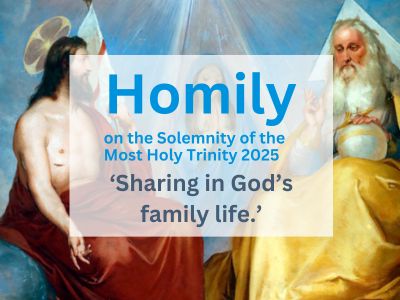Readings: Proverbs 8:22-31, Romans 5:1-5, John 16:12-15
Theme: Sharing in God’s family life
By Michael McCabe, SMA
The Trinity is the defining doctrine of our faith as Christians. We are baptized “in the name of the Father and of the Son and of the Holy Spirit” (Mt 28:19). We begin our formal and informal prayers with this Trinitarian formula. The great Eucharistic prayers of the Mass end with the beautiful Trinitarian prayer: ‘Through him (Jesus), with him, and in him, in the unity of the Holy Spirit, all glory and honour is Yours, Almighty Father, forever and ever’. The Trinity is not just a dogma of our faith, or a formula to be recited in our liturgy, but the heart of our Christian way of life. In the words of C.S. Lewis ‘what matters is that we are drawn into the three-personal life of God’, not that we understand the doctrine of the Trinity.
However, as the noted German theologian, Karl Rahner has observed, for many Catholics the doctrine of the Trinity makes little impact on their lives. I became aware of the truth of Rahner’s observation when when I was working in Liberia in the 1980’s and an African bishop asked me to review a short catechism for children. On reading the catechism I was surprised to find that the author had omitted any reference to the Trinity. I mentioned this to the Bishop who asked me to raise the issue with the author. This I did and here is what he said: ‘I decided it was best to leave out the Trinity. It’s far too complicated and abstract for the people to understand, and in any case it will make no practical difference in their lives.’ Sadly, the language in which we were taught, from our earliest years, to think and speak of God is the main reason for this defect. God, we were told, was unchangeable being, all sufficient, perfect, and far removed from the imperfect world we inhabit. The relationship between God and the world was presented as a one-way relationship. God, we were taught, was not be affected by anything that happened in the world. He was the unmoved mover, ‘watching us from a distance’, to quote the words of a popular song sung by Bette Middler.
Fortunately, this remote and distant God is not the God revealed in the Bible. The God of the Bible is the birthing God of creation; the Spirit God drawing life out of chaos and enabling a universe of creatures to evolve and flourish; God, the Word incarnate, becoming one with us and redeeming and transforming human history. The God of Sacred Scripture is a passionate and compassionate God, deeply moved by the sufferings of his creatures. In the words of Pope Francis, the Bible reveal a ‘God of love who created the universe and generated a people, became flesh, died and rose for us, and, as the Holy Spirit, transforms everything and brings it to fullness’. This is the God who is Father, Son and Spirit.
The doctrine of the Trinity is as much about us as it is about God. It is about how God relates with us and how we are called and challenged to relate to one another. It is about what it means to be persons created in the image of the One who is Love. Hence the Trinity is profoundly relevant to our everyday lives. To be human means to be like the God who created us; the God in whom we live and move and have our being; the God who chose to make his home among us through his Son; the God who lives within us through his Spirit. To become like this God of love means to live in relationships of love and respect, nor only with our fellow humans, but with all God’s creatures – all with whom we share the gift of life. In other words, we are called to participate fully in the Trinitarian communion of Father, Son and Spirit through our loving communion with one another and with all creation. Our liturgy today invites each of us to acknowledge and deepen our participation in the Trinitarian communion of Father, Son and Spirit. I can think of no better way of responding to this invitation than by reciting and reflecting on the great Trinitarian prayer of St Patrick, mindful that God loves us so much he cannot take his eyes off us.
I end with a few verses of Patrick’s Breastplate or Lorica.
I arise today
Through a mighty strength, the invocation of the Trinity,
Through a belief in the Threeness,
Through confession of the Oneness
Of the Creator of creation….
I arise today
Through God’s strength to pilot me;
God’s might to uphold me,
God’s wisdom to guide me,
God’s eye to look before me,
God’s ear to hear me,
God’s word to speak for me,
God’s hand to guard me,
God’s way to lie before me,
God’s shield to protect me,
God’s hosts to save me…
Christ with me, Christ before me, Christ behind me,
Christ in me, Christ beneath me, Christ above me,
Christ on my right, Christ on my left,
Christ when I lie down, Christ when I sit down,
Christ in the heart of everyone who thinks of me,
Christ in the mouth of everyone who speaks of me,
Christ in the eye that sees me,
Christ in the ear that hears me.
Alternative audio Homily by Tom Casey, SMA

